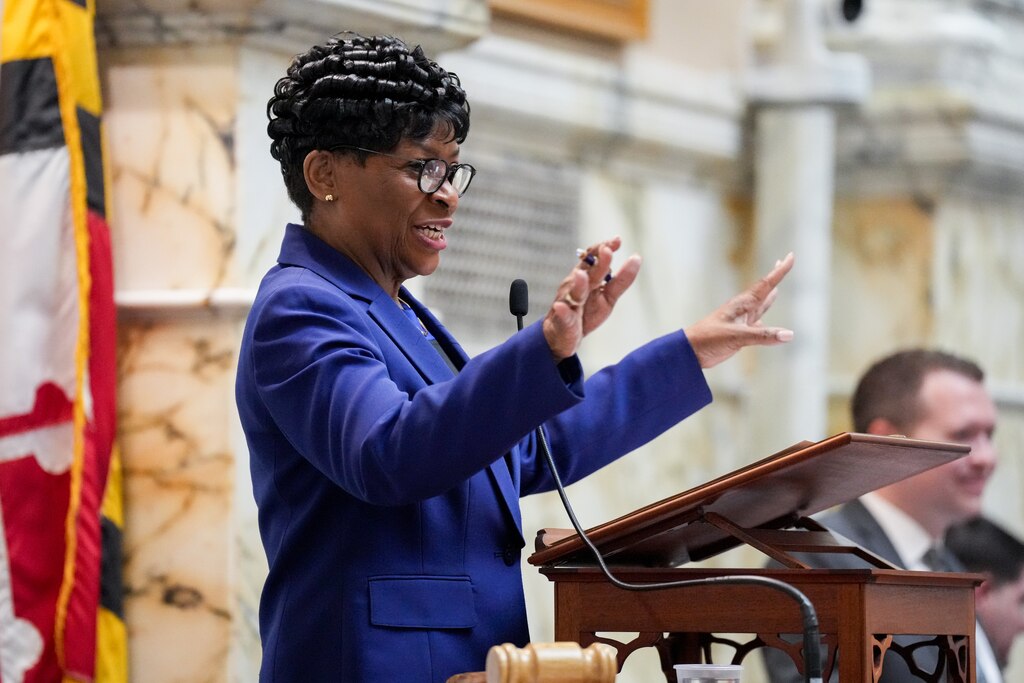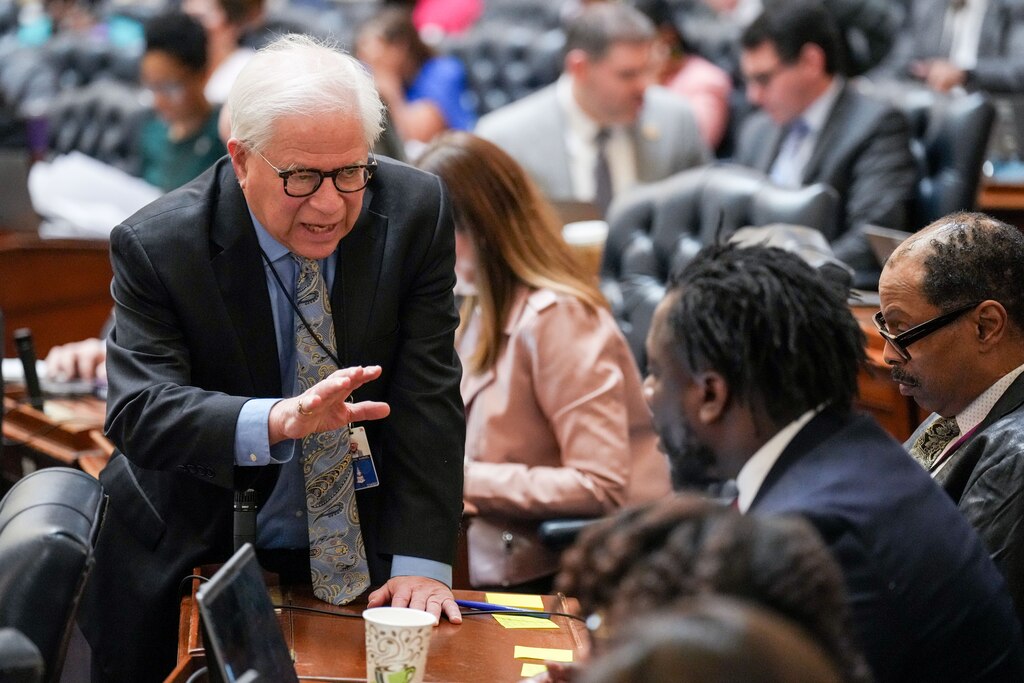Maryland lawmakers facing a critical deadline turned the legislative gears a little faster Monday, passing hundreds of bills between the chambers to give each the best chance of becoming law.
If a bill hasn’t been shuttled across the State House’s marble hallway by the last session on “crossover day,” it’s less likely to make it through the legislative process.
The General Assembly has filed more than 2,700 bills, a tall order for the short 90-day session. Senate President Bill Ferguson, speaking for his chamber, warned weeks ahead of the key date that a “crushing bill load” may keep some good ideas from advancing.
In the days leading up to Monday, both chambers held double floor sessions on Friday. The House of Delegates then pulled two more on Saturday, beating the steady drum of mid-session lawmaking in an otherwise empty State House.
On Monday, House lawmakers arrived to find containers of Tic Tacs on their desks, with a note from Speaker Adrienne A. Jones: “Take a deep minty breath!” Jones then led lawmakers through a marathon of passing bills so they could cross over to the Senate for consideration.
The Senate had a brief hiccup when it began lawmaking in the afternoon, after being forced to take a recess to fix problems with the chamber’s microphones. But soon the senators got on track, shepherding bills closer to passage.
Ferguson said Monday’s workload would be “pretty reasonable,” given the number of bills that already were passed last week. Even so, the Senate was still in session after sundown, hours after the earlier-arriving House of Delegates ended their work.
The only thing slowing the sausage making was the occasional amendment proposed by Republicans, the majority of which don’t get approved. Democrats vastly outnumber Republicans in both chambers and hold a supermajority able to override a governor’s veto.
Sen. Justin Ready, the No. 2 Republican in that chamber, described the stacks of paper that appear on his desk this time of year as amendments aimed at fixing “bad bills” or at those to “slow down and help our colleagues think.”
Minority party leaders kicked off crossover day explaining their position on certain legislation, including on House Democratic leaders’ budget decisions.
“I can’t explain what we’re doing on taxes,” Del. Jason Buckel said of his chamber’s move to raise $1.3 billion with more taxes and fees. He said he believes Senate leaders when they’ve said they won’t support measures the House is suggesting.
“Somehow my friends and colleagues in the Democratic leadership side seem to think that we’re just going to keep pushing,” the Allegany County Republican said.
Still, hundreds of bills have zipped through committees and sailed across leaders’ desks. Here’s where some key bills stand with three weeks to go.
Budget
The Senate passed its version of Gov. Wes Moore’s proposed budget last week, and the House will follow this week. But each chamber has different ideas on how soon they’ll need to raise money to cover future budget gaps — setting up an important debate in the final three weeks of the session.
The House is putting forward a $1.3 billion plan to fully legalize online gambling, close a corporate tax loophole and raise a variety of fees. But the Senate is only on board with raising a few fees for specific purposes. And the third player in this debate, Moore, has said he has “a very high bar” for significant new or expanded taxes.
Juvenile justice
Lawmakers moved these bills quickly, passing both versions from first hearings to full-chamber approvals in 24 days. But they’re not done yet. Leaders in both houses need to make the versions match.
One of the biggest differences involves how the state can best services to 10-, 11- and 12-year-olds who have committed offenses such as handgun possession and auto theft. For this population, the House wants to allow first offenders a one-time chance at a diversionary program without system involvement, while the Senate would like to use a longstanding option, called the child in need of services petition. However, House leaders hesitate to use a program that they say needs more review.
In addition to expanding the types of crimes children under 13 can be arrested for, key elements of the bill include extending the time judges can keep young offenders on probation and adding reasons kids 10 and older can face detention.
Moore has said he’ll sign a bill that contains accountability for youths and for the juvenile system.

Traveling in tandem with the juvenile justice legislation is a bill named in memory of 15-year-old NyKayla Strawder. The Baltimore teen was shot and killed in 2022 by a 9-year-old boy who had easy access to a gun. Strawder’s family wanted to make it mandatory for children like him to receive services, like therapy and mentorship, from the state. For the second consecutive year, the Senate concurred.
Moore’s priorities
Moore sent lawmakers more than a dozen proposals, and almost all have passed one or both chambers, including creating a gun violence prevention center in the state health department and the ENOUGH Act, which would send millions of dollars to community programs in neighborhoods with high rates of child poverty.
One of the governor’s bills not yet moving forward aims to address the housing crisis by allowing developers to build more units in projects that meet certain criteria: They’re near transit stops, they’re on former state property or they’re being built by a nonprofit organization. In order to be approved for the additional units, the projects would have to have a significant number of units at affordable prices.
Moore’s team is hopeful the housing bill will still move, even though it missed the crossover deadline.
Book bans
The Freedom to Read Act aims to address attempts to ban books by setting standards for public and school libraries that books cannot be removed because of an author’s background. It also protects library workers from discipline if they’re following the new standards. Versions of this bill have passed both the House and the Senate, and the measure is part of the House speaker’s “decency agenda” of bills intended to foster a more civil society.

Correctional ombudsman
The Senate passed a bill to create an ombudsman unit under the attorney general’s office. The office would have the power to investigate employees, officers and contractors working for the Department of Public Safety and Correctional Services. The unit will also be responsible for auditing programs and services available to incarcerated individuals.
Pava LaPere
Two bills were filed in memory of 26-year-old tech entrepreneur Pava LaPere, who was killed in September at her Baltimore apartment. The Pava LaPere Legacy of Innovation Act of 2024 is one of Moore’s bills that’s advancing and would create a permanent source of funding for startup tech companies with limited access to funds.
The Johns Hopkins University alum founded EcoMap Technologies before she graduated. The digital platform connects people looking to grow a business, get a job, find a project or an investor with networks that can help them advance.
The second bill in her name was driven by LaPere’s brutal killing after police discovered the convicted sex offender they charged with the crime had earned time off his sentence for good behavior. The bill would have kept those convicted of first-degree rape and first-degree sexual offenses from earning “good time” credits.
The House version of the good time credits bill carries LaPere’s name and has not advanced, but a similar bill in the state Senate was approved on Monday.
Vacant properties
A bill has passed both the House and the Senate that would allow local governments to set higher property tax rates for vacant properties. Originally a bill only for Baltimore, it’s now a statewide bill.
Gun bills
Lawmakers are advancing a bill that would send proceeds from an 11% sales tax on guns, ammunition and accessories to Maryland’s shock trauma system, with the measure passed by the Senate on Monday. The proceeds would cover medical expenses for patients without insurance, supplement the cost of having specialty physicians on standby, and fund violence prevention and victims’ support funds.
Sen. Jeff Waldstreicher’s measure to hold the firearms industry accountable has traction this year. The Senate approved the bill that will allow the attorney general or an individual to sue members of the firearms industry to keep guns from getting lost or stolen and for failing to implement “reasonable controls” of the sale, manufacture and marketing of firearms.
The Senate has also moved a bill that requires anyone conducting a gun buyback program to destroy the weapons and their component parts. Tucked inside this bill is a Republican-backed amendment to make firearm theft a felony rather than a misdemeanor property crime.
The House passed a bill banning possession of so-called “auto sears” or “Glock switches,” tiny devices that can turn a gun automatic — and more deadly.
Consumer protection
A bill passed by the Senate would require sellers of tickets to concerts, games and events to disclose all fees and would ban speculative ticket sales, when a reseller sells tickets to a consumer that they haven’t yet procured. Speculative ticket sales often drive up prices for consumers, advocates say.
Both chambers approved a requirement that certain online business entities must tell the state how they’ll protect kids’ personal data. The “Maryland Kids Code” applies to any business “that provides an online product reasonably likely to be accessed by children.” A similar law in California has been challenged in court, but supporters here say they’ve written the bill to withstand legal challenges.
“What we are saying is tech companies and companies in general that have an online presence cannot exploit, manipulate or harm our children for profit,” said. Del. Jared Solomon, a Montgomery County Democrat and one of the bill’s lead sponsors.
And all internet users would have their information better safeguarded under the Maryland Online Data Privacy Act. Versions of the act have passed both chambers.

Energy sales
The Senate has passed a bill setting restrictions on the companies that sell electricity plans, often door-to-door, which can end up being more expensive than standard service from BGE. Supporters say this will protect consumers, but the energy companies say it will cut down on energy competition. The measure is awaiting House action.
Pimlico plan
The owner of Pimlico Race Course has agreed to donate the historic Baltimore track to the state, so the state can own it, renovate it and run thoroughbred racing there — a plan that would require state legislation to move around existing racing subsidies to pay for the renovation. The bill was introduced last week and is expected to easily pass the post-crossover procedural steps necessary to move forward.
Food bills
The Senate voted to late in the day to make the persimmon Maryland’s state fruit — though half a dozen lawmakers voted against — and both chambers previously voted to rename the invasive northern snakehead fish as the “Chesapeake Channa.”
English language learners
The House and Senate have passed versions of a bill that would require community colleges to grant academic credit for advanced English language learning classes. The versions differ, however, on which colleges and universities must accept the credits — a difference that will need to be worked out before the bill could be sent to the governor.

Protecting children who are victims of crime
Both chambers passed a bill that would automatically redact the names of children who are victims of crime from public-facing court records. But the House and Senate versions are slightly different and would need to be reconciled.
Medical aid in dying
Lawmakers opted not to take a vote this year on a measure that would have allowed terminally ill residents to obtain a prescription they could take to initiate their own death. Lawmakers have considered this proposal off and on for nearly a decade, but hasn’t had enough votes to pass.
Access to Care Act
Lawmakers have passed legislation in both the House and Senate to allow immigrants who lack documentation to use the state’s health exchange to buy their own insurance plans. The federal government has to sign off on the change, and it could take a couple years before it’s in place.



Comments
Welcome to The Banner's subscriber-only commenting community. Please review our community guidelines.